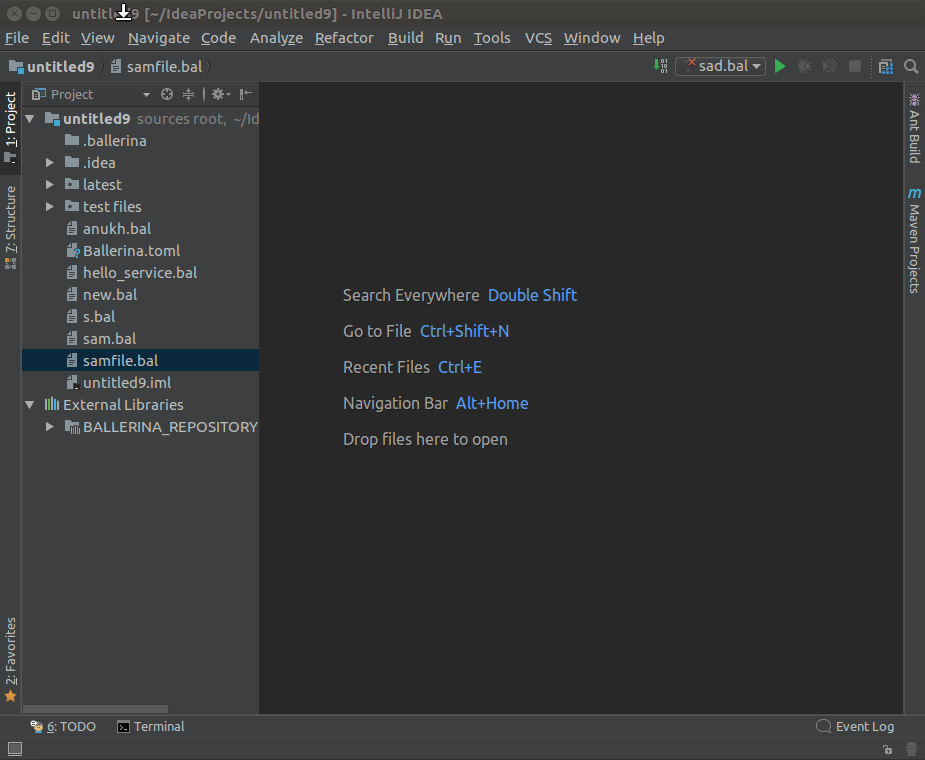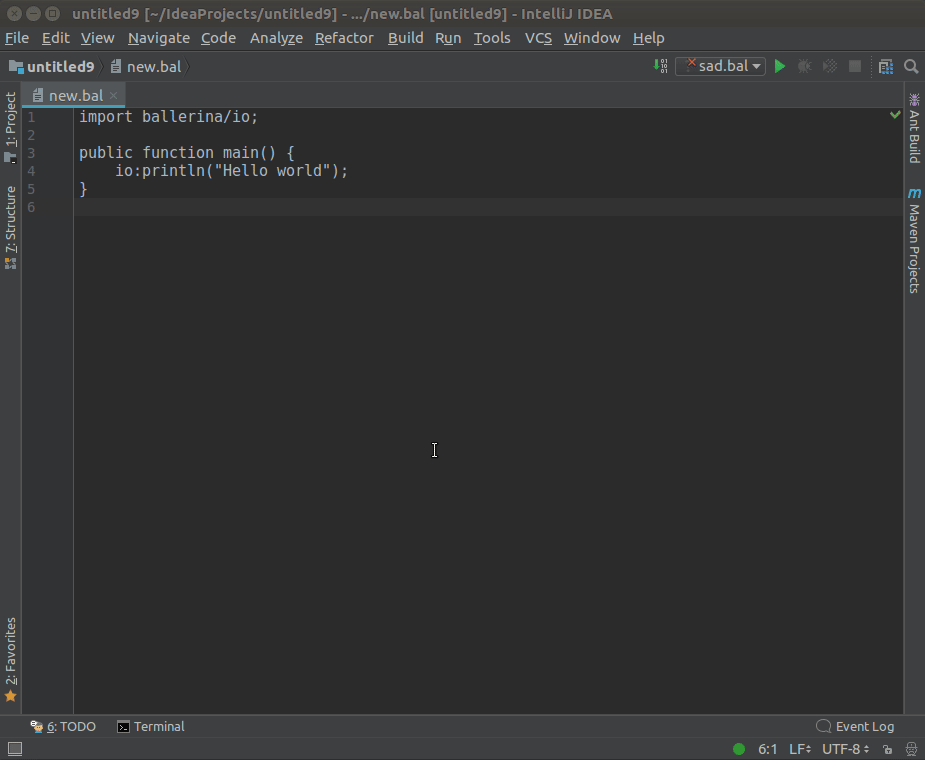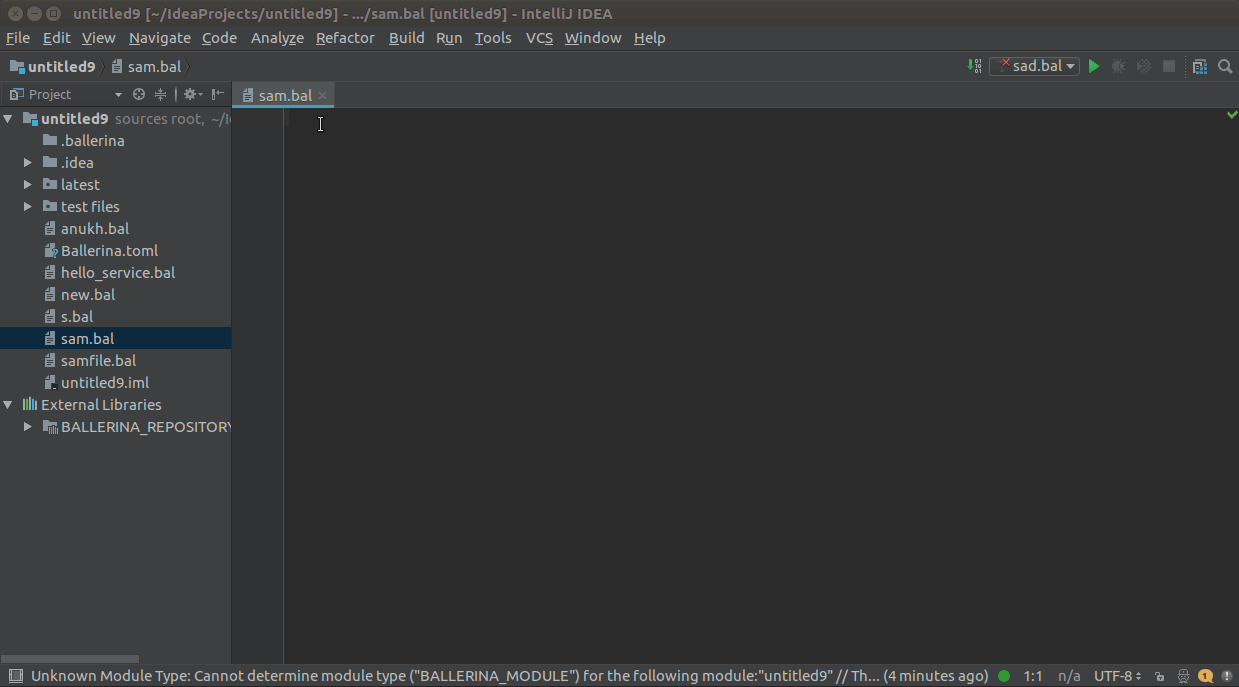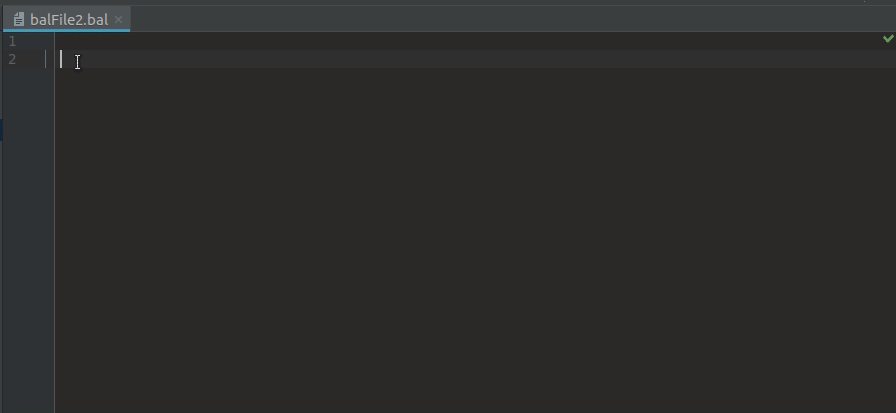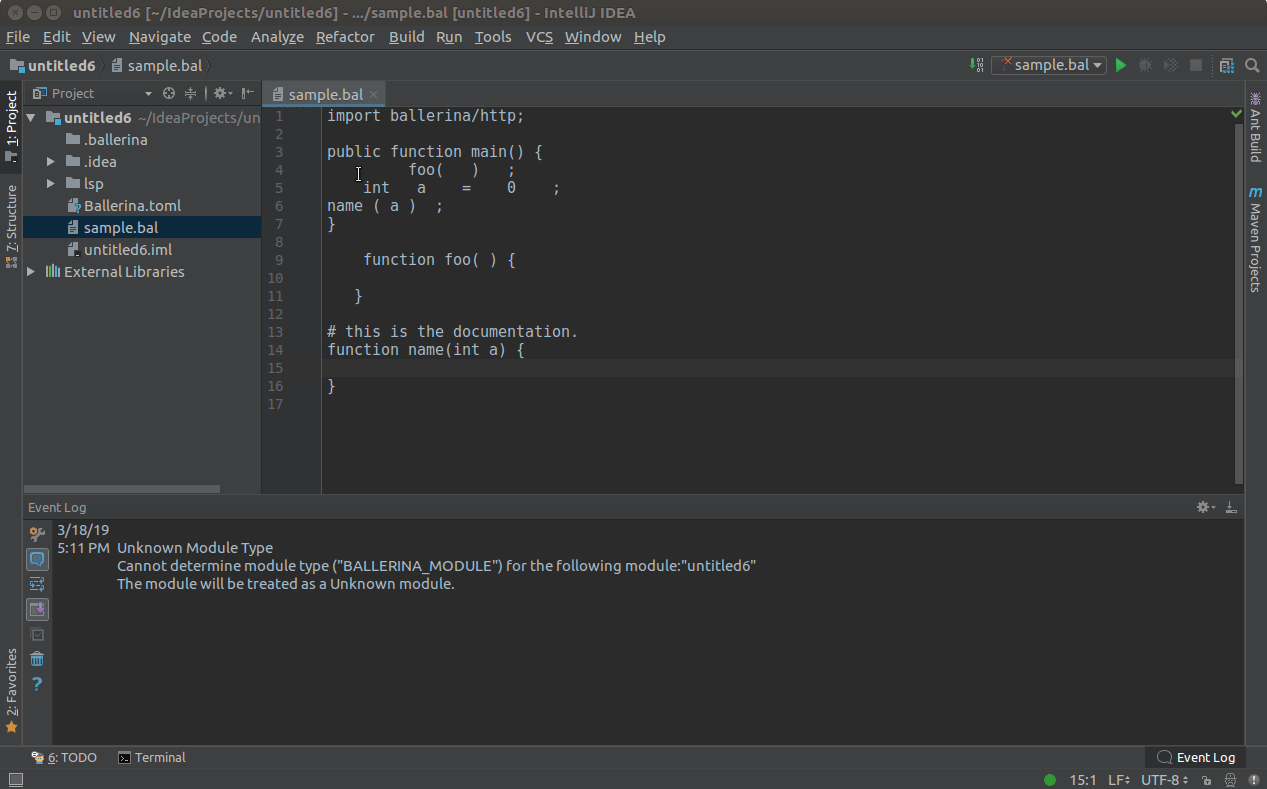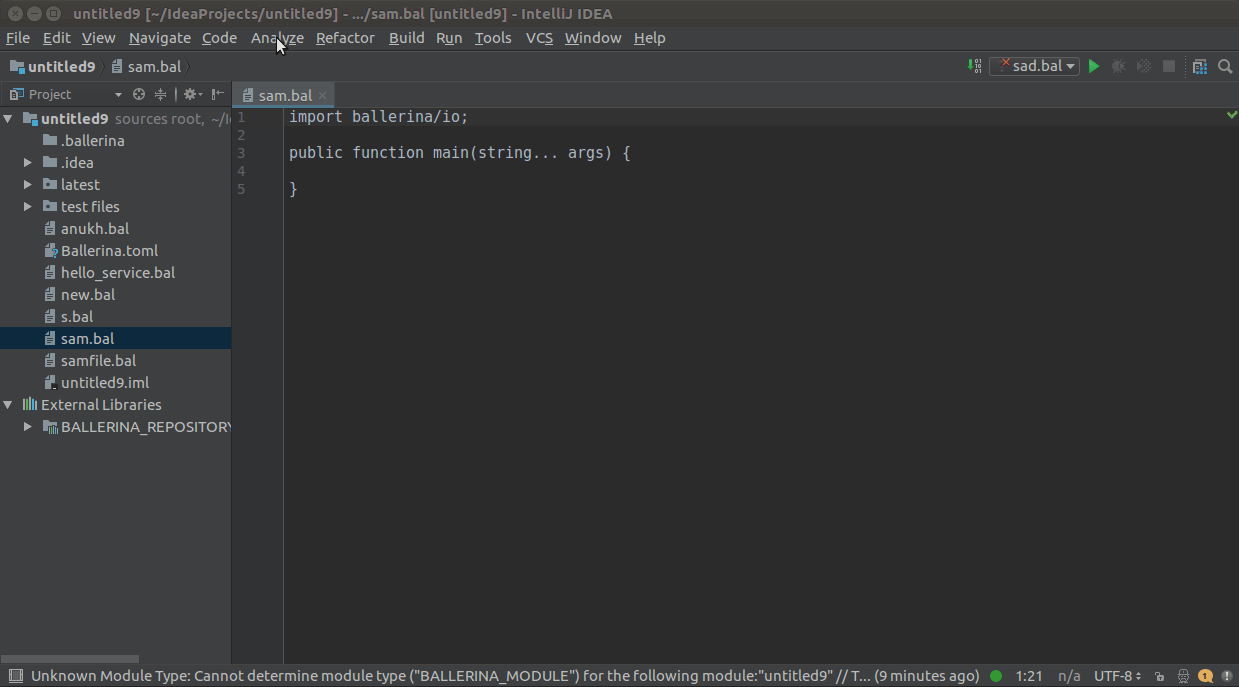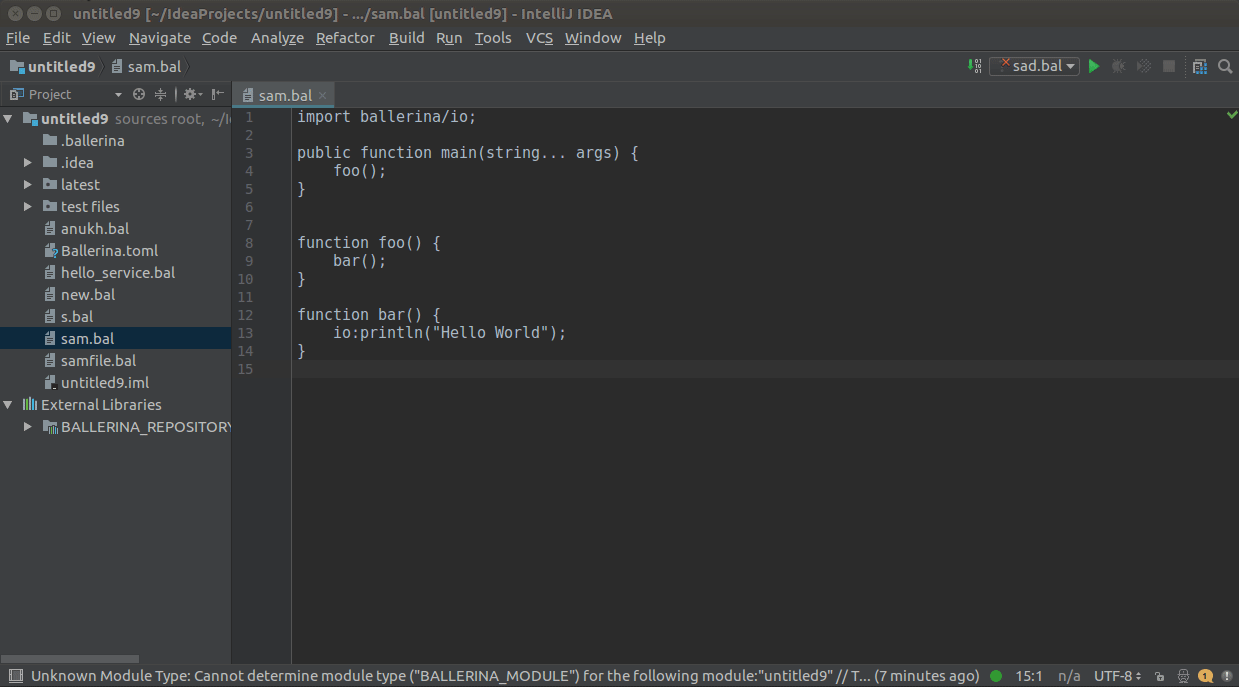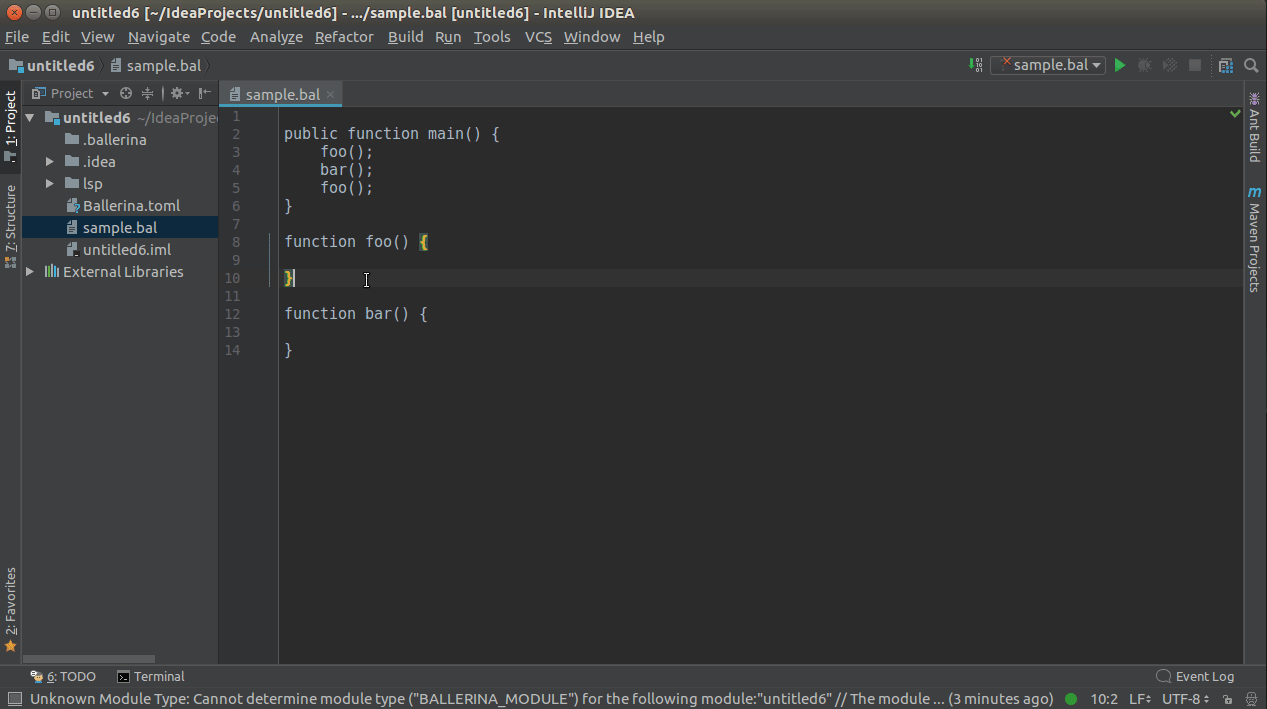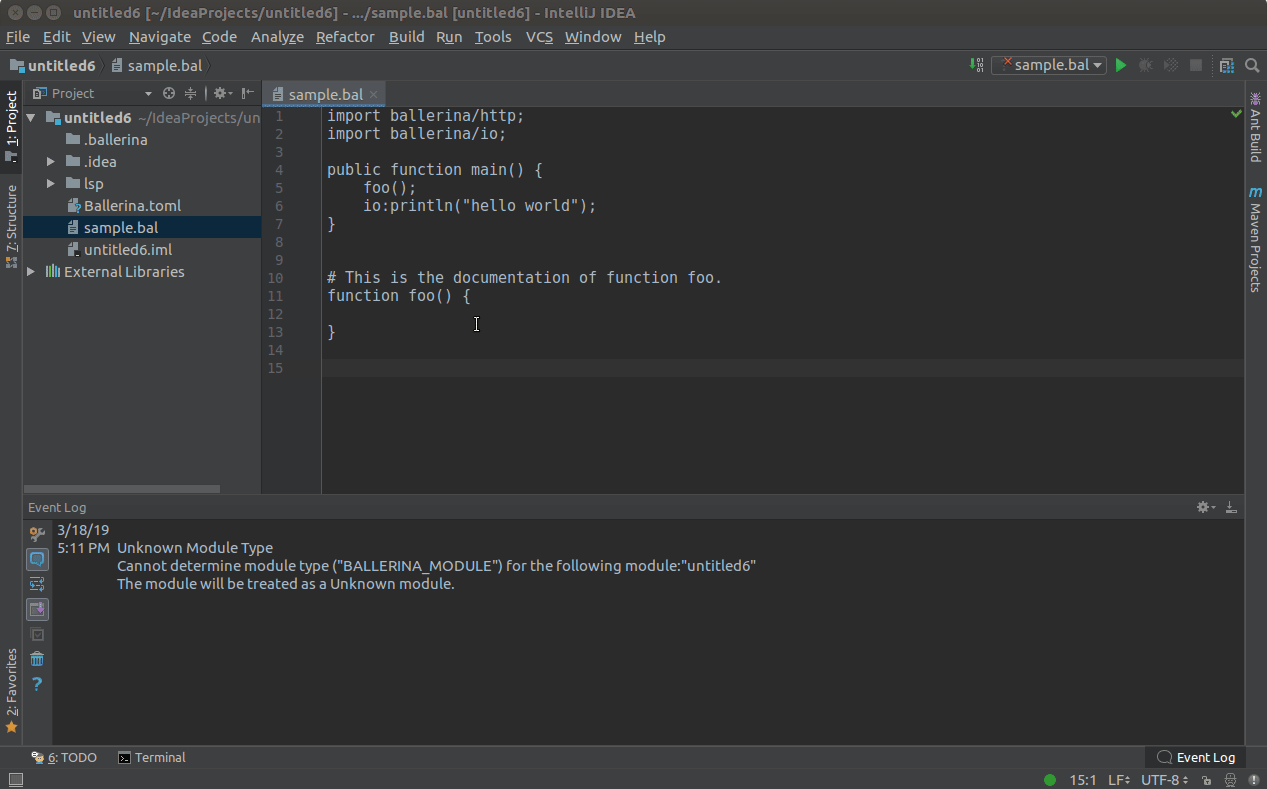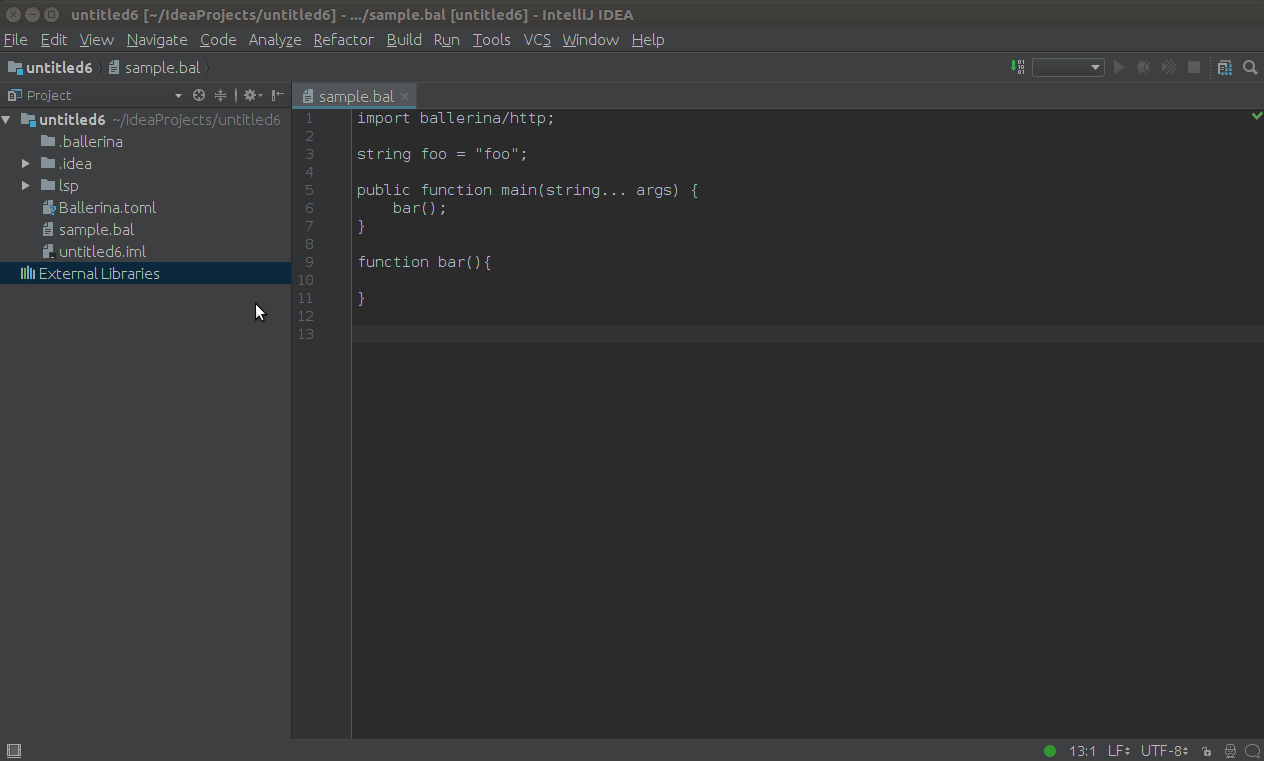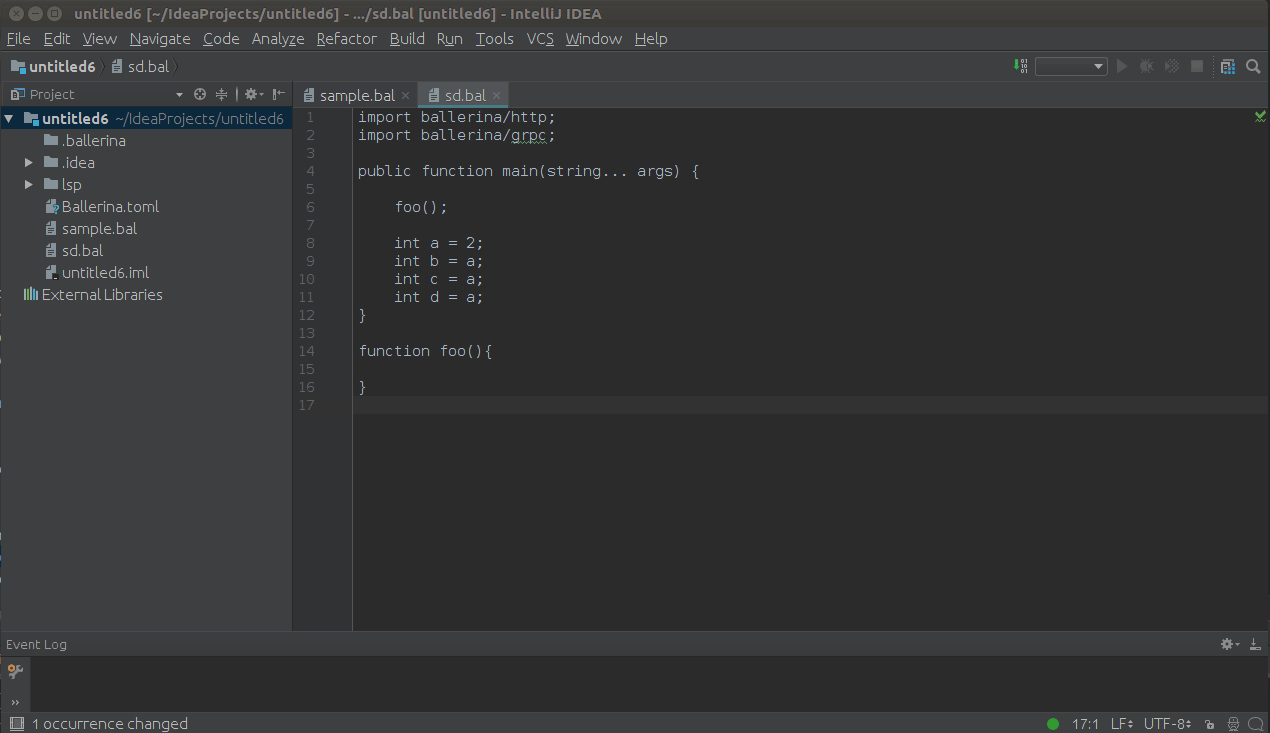ballerina-platform / Lsp4intellij
Programming Languages
Projects that are alternatives of or similar to Lsp4intellij
LSP4IntelliJ - Language Server Protocol Support for the Jetbrains Plugins
Lsp4IntelliJ is a client library, which provides language server support for IntelliJ IDEA and other Jetbrains IDEs.
It is designed to be used with any IntelliJ plugin as its language server client to get the features that are based on the language server.
Also, it allows the plugin developers to use language-specific language server protocol extensions via the JSON-RPC protocol.
Table of Contents
How to use
Follow the steps below to use Lsp4IntelliJ in your custom language plugin.
1. Add the lsp4intellij dependency in the build file of the project.
For instructions on adding Lsp4IntelliJ as a dependency when using the below build tools, go to jitpack/lsp4intellij.
- gradle
- maven
- sbt
Info: - The Maven publishing process is currently WIP. Thus, the possibility to add LSP4IntelliJ as a dependency will be available soon in the Maven central.
2. Add the language server definition
-
Instantiate a concrete subclass of the LanguageServerDefinition.
You can use the following concrete class:
-
RawCommandServerDefinition(string fileExtension, string[] command)
This definition can be used to start a language server using a command.
-
You can specify multiple extensions for a server by separating them with a comma (e.g., "ts,js").
-
If you want to bind your language server definition only with a specific set of files, you can use that specific file pattern as a regex expression instead of binding with the file extension (e.g., "application*.properties").
Examples:
Ballerina Language Server
new RawCommandServerDefinition("bal", new String[]{"path/to/launcher-script.sh"});
BSL Language Server
String[] command = new String[]{"java","-jar","path/to/language-server.jar"}; new RawCommandServerDefinition("bsl,os",command);
-
-
ProcessBuilderServerDefinition(string fileExtension, string[] command)
This definition is an extended form of the RawCommandServerDefinition, which accepts
java.lang.ProcessBuilderinstances so that the users will have more controllability over the language server process to be created.-
You can specify multiple extensions for a server by separating them with a comma (e.g., "ts,js").
-
If you want to bind your language server definition only with a specific set of files, you can use that specific file pattern as a regex expression instead of binding with the file extension (e.g., "application*.properties").
Examples:
Ballerina Language Server
ProcessBuilder process = new ProcessBuilder("path/to/launcher-script.sh"); new ProcessBuilderServerDefinition("bal", process);
BSL Language Server
ProcessBuilder process = new ProcessBuilder("java","-jar","path/to/language-server.jar"); new ProcessBuilderServerDefinition("bsl,os", process);
-
Note: All of the above implementations will use server stdin/stdout to communicate.
-
-
To register any of the aforementioned options, implement a preloading activity in your plugin as shown below.
Tip: For other options you can use instead of implementing a preloading activity, go to InteliJ Plugin initialization on startup to)
Example:
public class BallerinaPreloadingActivity extends PreloadingActivity {
IntellijLanguageClient.addServerDefinition(new RawCommandServerDefinition("bal", new String[]{"path/to/launcher-script.sh"}));
}
With plugin.xml containing;
<extensions defaultExtensionNs="com.intellij">
<preloadingActivity implementation="io.ballerina.plugins.idea.preloading.BallerinaPreloadingActivity"
id="io.ballerina.plugins.idea.preloading.BallerinaPreloadingActivity" />
</extensions>
3. Add configurations to the plugin.xml file
-
Add
IntellijLanguageClientas an application component.<application-components> <component> <implementation-class>org.wso2.lsp4intellij.IntellijLanguageClient</implementation-class> </component> </application-components>
-
Add the following extensions to get the relevant features as listed below.
- Code completion (You can replace the
languageattribute if you already have your own custom language implementations)<extensions defaultExtensionNs="com.intellij"> <completion.contributor implementationClass="org.wso2.lsp4intellij.contributors.LSPCompletionContributor" id="LSPCompletionContributor" language="any"/> </extensions>
- Code Formatting
<actions> <action class="org.wso2.lsp4intellij.actions.LSPReformatAction" id="ReformatCode" use-shortcut-of="ReformatCode" overrides="true" text="Reformat Code"/> <action class="org.wso2.lsp4intellij.actions.LSPShowReformatDialogAction" id="ShowReformatFileDialog" use-shortcut-of="ShowReformatFileDialog" overrides="true" text="Show Reformat File Dialog"/> </actions>
- Diagnostics and code actions (You can replace the
languageattribute if you already have your own custom language implementations)<extensions defaultExtensionNs="com.intellij"> <externalAnnotator id="LSPAnnotator" language="TEXT" implementationClass="org.wso2.lsp4intellij.contributors.annotator.LSPAnnotator"/> </extensions>
- Find Usages
<actions> <action class="org.wso2.lsp4intellij.actions.LSPReferencesAction" id="LSPFindUsages"> <keyboard-shortcut first-keystroke="shift alt F7" keymap="$default"/> </action> </actions>
- Workspace symbols
<extensions defaultExtensionNs="com.intellij"> <gotoSymbolContributor implementation="org.wso2.lsp4intellij.contributors.symbol.LSPSymbolContributor" id="LSPSymbolContributor"/> </extensions>
- Renaming Support
<extensions defaultExtensionNs="com.intellij"> <renameHandler implementation="org.wso2.lsp4intellij.contributors.rename.LSPRenameHandler" id="LSPRenameHandler" order="first"/> <renamePsiElementProcessor implementation="org.wso2.lsp4intellij.contributors.rename .LSPRenameProcessor" id="LSPRenameProcessor" order="first"/> </extensions>
- Signature Help
<extensions defaultExtensionNs="com.intellij"> <typedHandler implementation="org.wso2.lsp4intellij.listeners.LSPTypedHandler" id="LSPTypedHandler"/> </extensions>
- Code completion (You can replace the
Note: You do not need any additional configurations for the other features.
If you have connected to your language server successfully, you will see a green icon at the bottom-right side of your IDE when opening a file that has a registered file extension as shown below.
Tip: You can also click on the icon to see the connected files and the timeouts.
Features
Code Completion (with code snippet support)
Press the CTRL+SPACE keys to see the completion items list, which depends on your cursor position.(Code completion items
will also pop-up auytomatically based on your language-server-specific trigger characters.)
For Code Snippets, you can use TAB/ENTER to navigate to the next place holder position or ESC to apply the code snippets with the default values.
Code Formatting
Navigate to Code->Reformat Code and you will get a dialog to choose whether to format the whole file or the selected range.
Diagnostics
To see diagnostics (errors, warnings etc.), hover over them to view the message.
Code Actions
Hover over any diagnostic highlight to view and apply related code actions using the light bulb that pops up as
shown below.
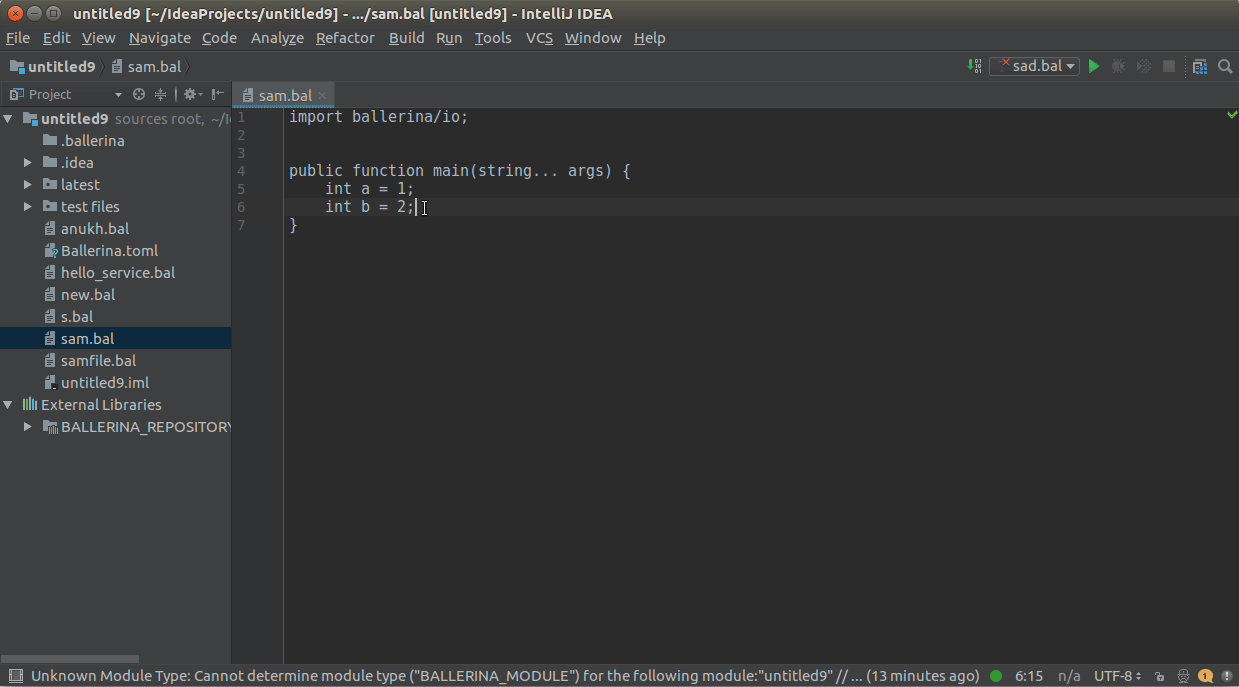
Go to Definition
You can use CTRL+CLICK(COMMAND+CLICK in MacOS) to navigate to its definition.
Goto References / Find Usages
You can use CTRL+CLICK(COMMAND+CLICK in MacOS) or SHIFT+ALT+F7 for a symbol to view the list of its references/usages.
Hover Support
You can hover over an element while pressing the CTRL(COMMAND in MacOS) key to view its documentation if available.
Workspace Symbols
Click Navigate in the top menu, then click Symbol..., and enter the name of the symbol you want to search in the search box that pops up.
Renaming Support
Set the courser to the element which needs to renamed and press SHIFT+F6 to trigger the in-place renaming as shown
below.
Note - Above features are currently tested only with IntelliJ IDEA and the Ballerina Language Server.
WIP Features
- Signature Help
User API
Timeouts
The Lsp4IntelliJ language client has default timeout values for LSP-based requests as shown below.
| Type | Default timeout value(in milliseconds) |
|---|---|
| Code Actions | 2000 |
| Completion | 1000 |
| Goto Definition | 2000 |
| Execute Command | 2000 |
| Formatting | 2000 |
| Hover Support | 2000 |
| Initialization | 10000 |
| References | 2000 |
| Shutdown | 5000 |
| WillSave | 2000 |
The LspIntelliJ language client provides following methods related to timeout configurations.
-
getTimeouts() - Returns the current timeout values (in milliseconds).
Example:
Map<Timeouts, Integer> timeouts = IntelliJLnaguageClient.getTimeouts();
-
getTimeout(Timeouts timeoutType) - Returns the current timeout value of a given timeout type (in milliseconds).
Example
int timeout = IntellijLanguageClient.getTimeout(Timeouts.INIT);
-
setTimeouts(Map<Timeouts, Integer> newTimeouts)) - Overrides the default timeout values with a given set of timeout values.
Example
Map<Timeouts,Integer> newTimeouts = new HashMap<>(); newTimeouts.put(Timeouts.INIT,15000); newTimeouts.put(Timeouts.COMPLETION,1000); IntellijLanguageClient.setTimeouts(newTimeouts);
-
setTimeout(Timeouts timeout, int value) - Overrides a specific timeout value with a new one.
Example
IntellijLanguageClient.setTimeout(Timeouts.INIT, 15000);
License
The LSP4Intellij code is distributed under the Apache license 2.0.
Inspiration
Lsp4IntelliJ is heavily inspired by the intellij-lsp plugin community.
Credits should go to the original author for his astounding work.


